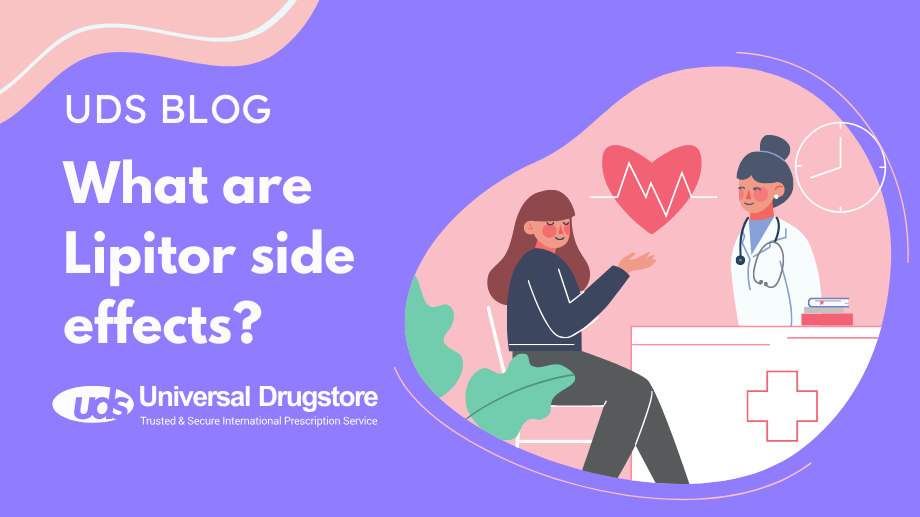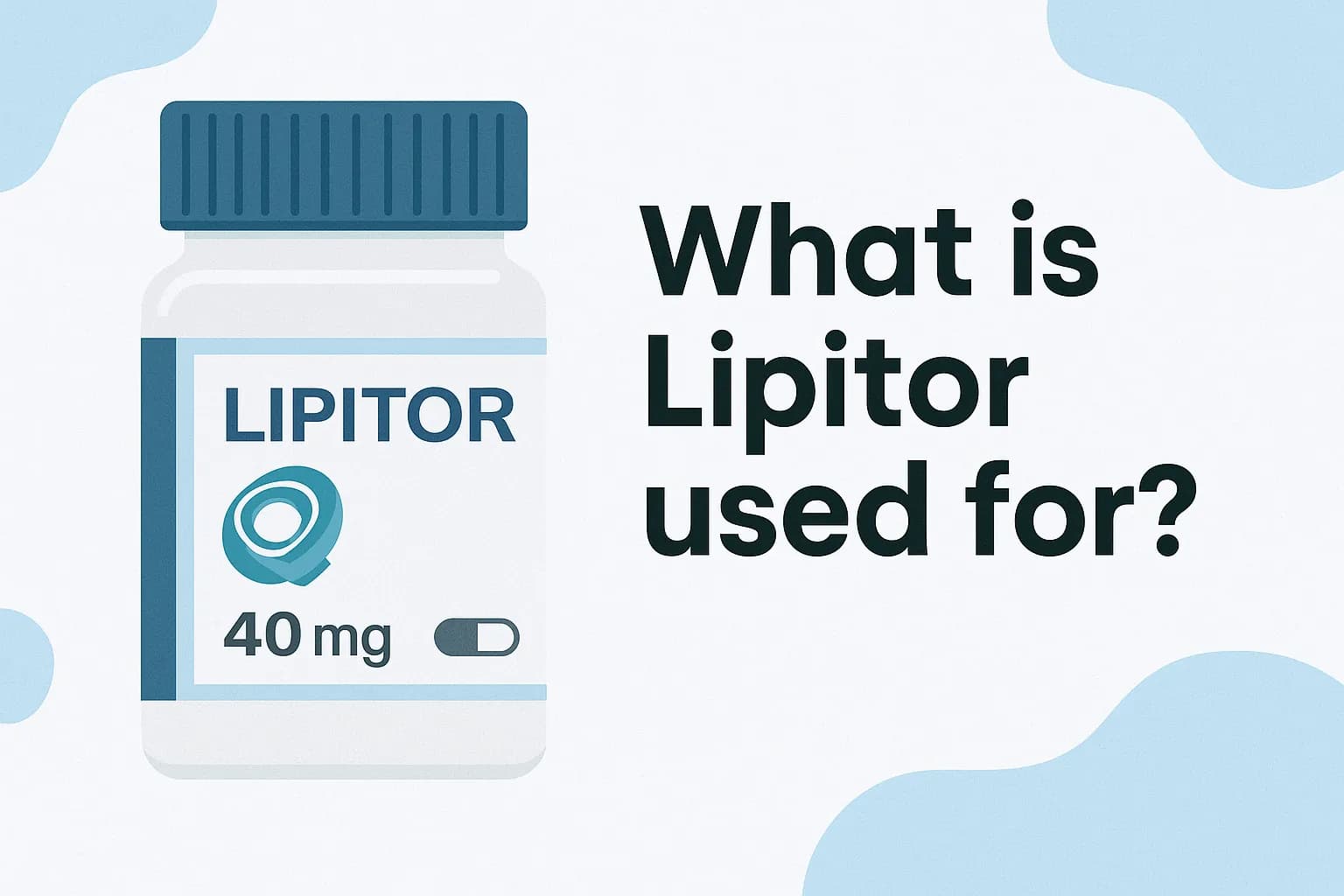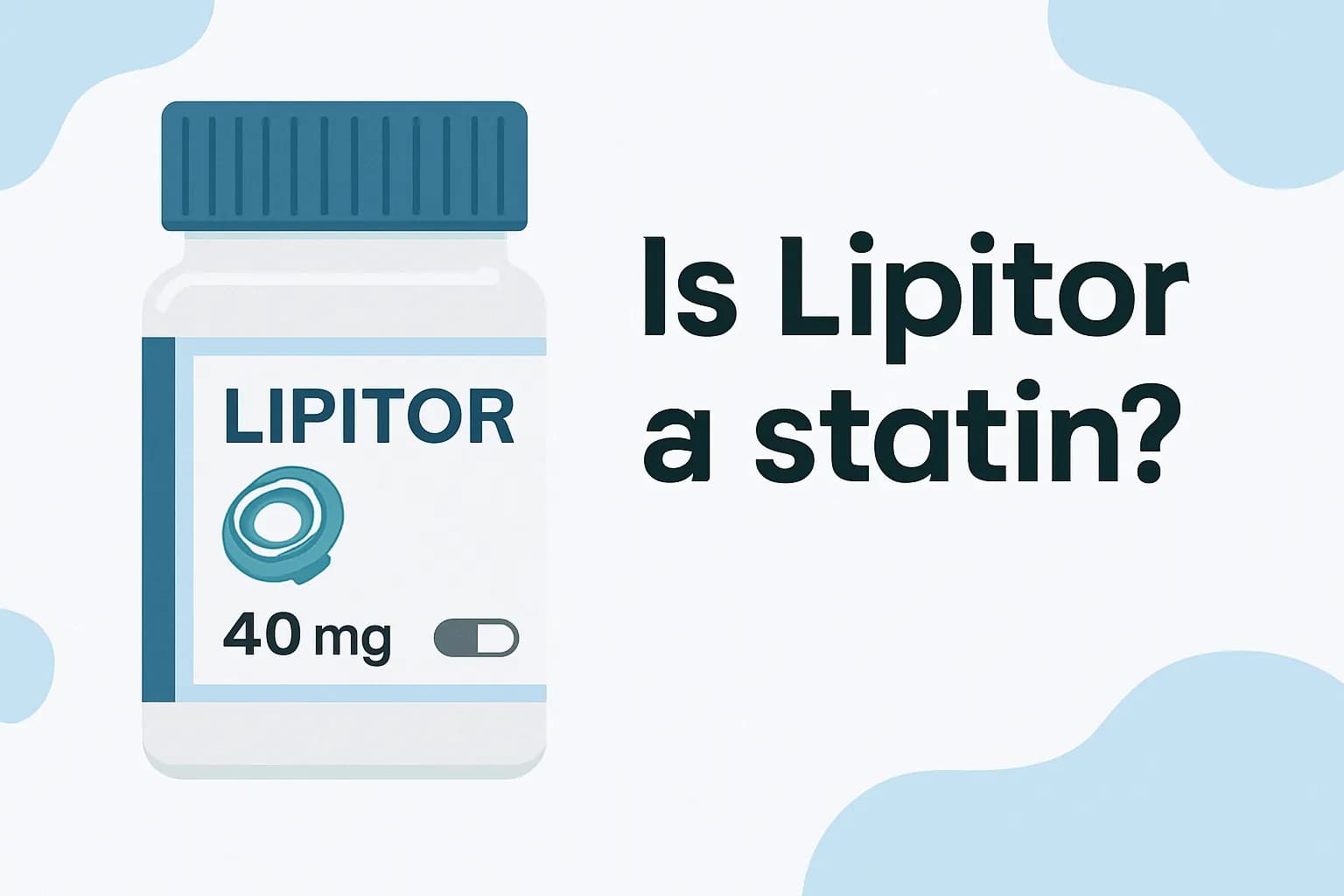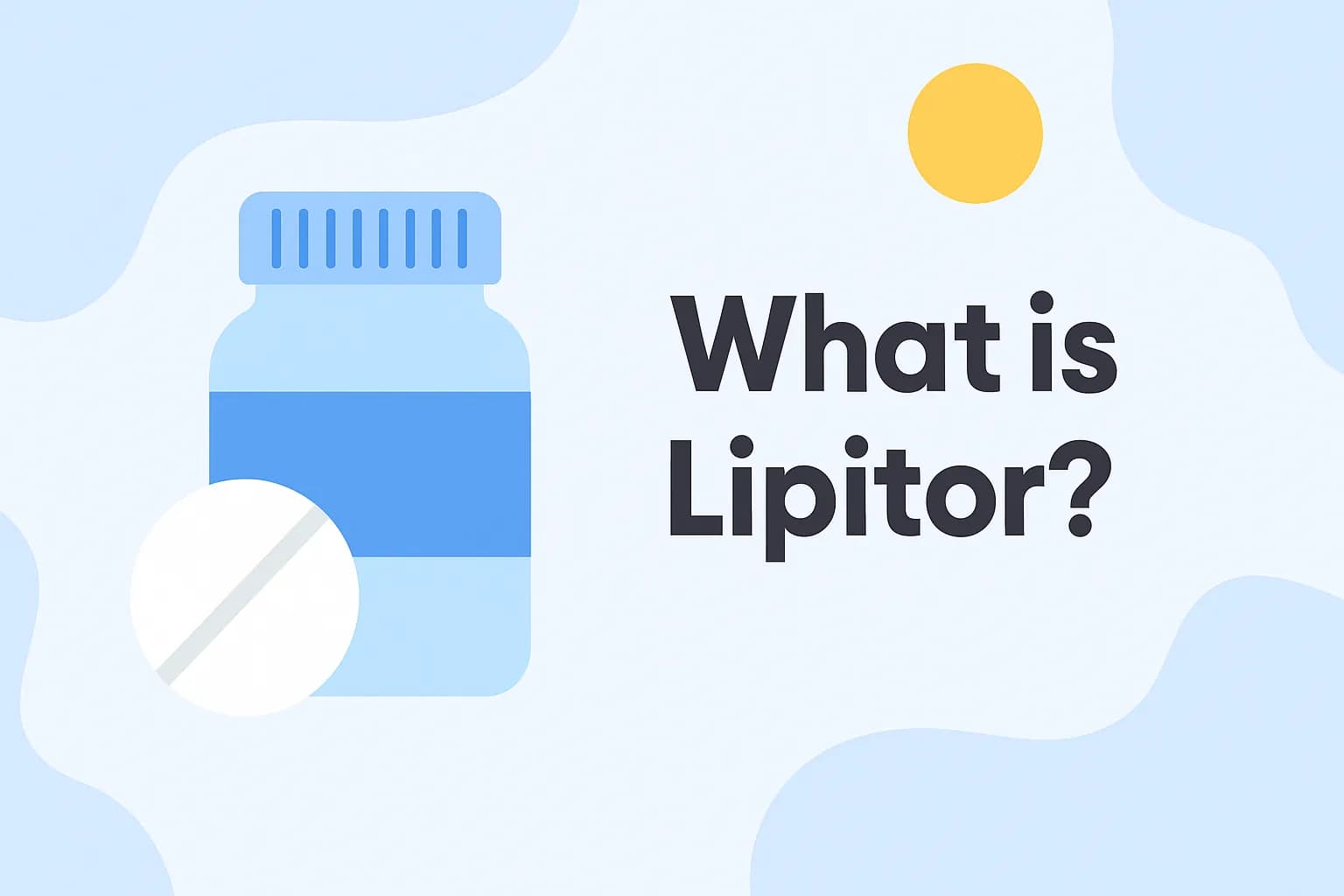What are Lipitor side effects?

Healthcare professionals often prescribe statin medications for people with high cholesterol. Having too much cholesterol in your blood increases your risk of heart attacks, cardiovascular disease, and strokes. Lipitor (atorvastatin), a brand-name statin manufactured by Pfizer, is one of the most popular ones. While it is very effective and safe for most people, Lipitor has been linked to common side effects such as muscle pain, digestive problems, and common cold symptoms in some people. These are typically mild and go away after your body gets used to the medication. Rarely, it can also cause serious side effects such as liver and kidney damage. If you think you are experiencing side effects from taking Lipitor, do not just stop taking it. Talk to your healthcare provider to see if you need a change in dose or medication.
Keep reading as we will detail what side effects occur with Lipitor as well as other frequently asked questions.
What are the most common side effects of Lipitor?
The most common side effects of Lipitor seen in clinical trials include:
- Runny nose or sore throat
- Joint pain
- Diarrhea
- Pain in arms and legs
- Pain while urinating, needing to urinate more often, and other symptoms of a urinary tract infection (UTI)
Other possible side effects of Lipitor include:
- Indigestion
- Nausea
- Muscle pain or muscle weakness (myopathy)
- Trouble sleeping
- Constipation
- Memory loss, forgetfulness, amnesia, memory impairment, confusion
What serious side effects occur with Lipitor?
Rarely, Lipitor may cause severe side effects such as:
Serious, life-threatening allergic reactions, including anaphylaxis.
Symptoms of anaphylaxis may include hives (raised red patches on your skin), skin rash, swelling of your face, lips, tongue, or throat, and shortness of breath. Seek immediate medical attention if you experience any symptoms of a serious allergic reaction.
Severe muscle pain and damage
This medication can cause a rare but potentially life-threatening muscle problem called rhabdomyolysis. Rhabdomyolysis can cause extreme muscle pain, liver damage, kidney failure, and death. Your risk is higher if you take other medications that can interact with Lipitor and raise the levels of it in your body. If you notice any symptoms of rhabdomyolysis, such as severe muscle pain, dark-colored urine, weakness, and tiredness, stop taking Lipitor and seek medical attention immediately.
You are also at a higher risk of muscle damage if you drink large amounts of grapefruit juice, are 65 years of age or older, have thyroid problems (hypothyroidism) that are not controlled, have kidney problems, or are taking higher doses of this medication.
Liver problems
Although rare, Lipitor may cause serious liver problems that can lead to liver failure. You should get blood tests to check your liver function before starting Lipitor and while you are taking it to make sure your liver is working properly. Get medical attention right away if you notice stomach pain or swelling, yellowing of your skin or the whites of your eyes, black, tarry, or bloody stools, loss of appetite, nausea, vomiting, confusion, or dark-colored urine. You may need to stop taking Lipitor to prevent further liver damage.
Increased blood sugar
Some research suggests this medication can raise your blood sugar levels. However, most healthcare providers believe that the benefits of Lipitor outweigh its risk for harm. Let your healthcare provider know if you have high blood sugar levels before starting this medication because you may need to check your blood sugar more often. Also, be sure to eat a healthy, balanced diet and exercise regularly while taking Lipitor.
Harm to unborn and breastfed babies
Lipitor should not be taken by pregnant or breastfeeding females. This medication may cause harm to your unborn and breastfed infant. If you are pregnant, thinking of becoming pregnant, or breastfeeding, ask your provider about the safest options for you.
These are not all of the possible adverse events of Lipitor. You should always seek medical advice from a healthcare professional for any questions or concerns about your medical condition or treatment. You should also read all the patient information, including your Medication Guide that comes with Lipitor. You can report side effects to the FDA at 1-800-FDA-1088 or www.fda.gov/medwatch.
Lipitor FAQs
What does Lipitor treat?
Lipitor is approved by the U.S. Food and Drug Administration (FDA) to be used:
Shop Medications
- To reduce the risk of heart attack, stroke, chest pain, and certain types of heart surgery in adults who don’t have heart disease but have other risk factors for heart disease.
- To reduce the risk of heart attack and stroke in adults with type 2 diabetes mellitus (T2DM) who do not have heart disease but have other risk factors for heart disease.
- To reduce the risk of heart attack that does not cause death, stroke, certain types of heart surgery, hospitalization for congestive heart failure, and chest pain in adults with heart disease.
- Along with diet to reduce low-density lipoprotein cholesterol (LDL-C) or bad cholesterol in adults. It is also used to treat children 10 years of age and older with a genetic condition that causes high bad cholesterol levels.
- Along with diet for the treatment of adults with high triglyceride levels.
How does Lipitor work?
The active ingredient in Lipitor is atorvastatin, which is considered an HMG-CoA reductase inhibitor (statin). It works by blocking the enzyme in your liver that makes cholesterol. This helps lower your bad cholesterol or low-density lipoprotein (LDL). It can also raise your good cholesterol or high-density lipoprotein (HDL) levels and lower your triglyceride levels. By lowering your bad cholesterol and increasing your good cholesterol, this can help reduce your risk of heart attack and stroke.
What should you tell your healthcare provider before taking Lipitor?
You should not take this medication if you have an allergy to atorvastatin or any of the inactive ingredients in this product. You should be sure your healthcare provider is aware of all your medical conditions as you may need increased monitoring during treatment, including:
- Any unexplained muscle aches or weakness
- Liver disease
- Drinking more than 2 alcoholic beverages daily
- Diabetes
- Thyroid disease
- Kidney disease
- A previous stroke
- If you are pregnant or plan to become pregnant as this medication may harm your unborn baby
- If you are breastfeeding or plan to breastfeed as breastfeeding is not recommended while on Lipitor
Are there any drug interactions with Lipitor?
When Lipitor is taken with other prescription drugs, over-the-counter medications, vitamins, herbal products, and supplements, it may change how they work or increase the risk of side effects. Tell your healthcare provider about all your current medications, including:
- Other cholesterol-lowering medications such as gemfibrozil, fenofibrate, and niacin
- Colchicine
- Antifungals or antibiotics such as rifampin, clarithromycin, erythromycin, ketoconazole, voriconazole, and itraconazole
- Birth control pills
- Immunosuppressants used to prevent organ transplant rejection
- Antiviral medications to treat HIV or hepatitis C
This list is not complete and many other drugs may interact with Lipitor.
What should you do if you miss a dose of Lipitor?
If you miss a dose of Lipitor, take it as soon as you remember. If it has been more than 12 hours since you missed your dose of Lipitor, skip the missed dose and take it at its next scheduled time. Do not take 2 doses at the same time to make up for a missed dose.
Can Lipitor cause muscle pain and weakness?
One of the most common complaints associated with statin use is muscle pain. You may experience this pain as a soreness, tiredness, or weakness in your muscles. It can be a mild discomfort, or it can be serious enough to make it hard to do your normal daily activities. However, rarely, this can be serious and lead to liver or kidney damage and death. Notify your healthcare provider immediately if you have:
- Any unexplained muscle weakness, tenderness, or pain, especially if you also have a fever or feel more tired than usual while taking this medication.
- Muscle problems that do not go away after you have stopped taking Lipitor. Your healthcare provider may do further testing to diagnose the cause of your muscle problems.
What can you do if you get muscle pain from Lipitor?
Muscle weakness and pain are common side effects of statins such as Lipitor. They can occur at any time during treatment, even if you have been on Lipitor for years without any problems. Let your healthcare provider know immediately if you develop muscle weakness or pain. They may recommend lowering your dose or changing how often you take Lipitor (taking it every other day instead of every day). They may switch you to another statin because you might not have the same side effects you had while taking Lipitor. Be sure to seek medical attention right away if you notice dark-colored urine or fever in addition to muscle pain. These can be signs of a very serious condition called rhabdomyolysis (muscle breakdown).
How should I store Lipitor?
Lipitor should be stored in its original container at room temperature between 68°F-77°F (20°C-25°C). As with all medications, keep Lipitor out of the reach of children.
Related Medications
- Zocor (simvastatin)
- Zetia (ezetimibe)
- Vytorin (ezetimibe/simvastatin)
- Crestor (rosuvastatin)
- Livalo (pitavastatin)
- Pravachol (pravastatin)
Sources
- Lipitor Medication Guide: https://dailymed.nlm.nih.gov/dailymed/fda/fdaDrugXsl.cfm?setid=c6e131fe-e7df-4876-83f7-9156fc4e8228&type=display#section-16
- Lipitor Prescribing Information: https://dailymed.nlm.nih.gov/dailymed/fda/fdaDrugXsl.cfm?setid=c6e131fe-e7df-4876-83f7-9156fc4e8228&type=display
- Medscape: https://reference.medscape.com/drug/lipitor-atorvaliq-atorvastatin-342446#0
- Prescriber’s Digital Reference: https://www.pdr.net/drug-summary/?drugLabelId=2338





